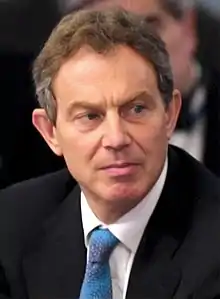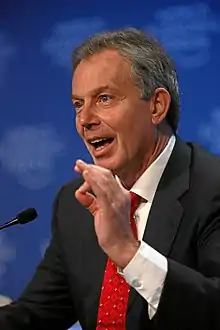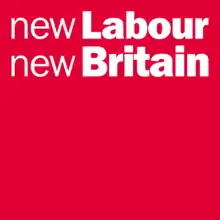Second Blair ministry
The second Blair ministry lasted from June 2001 to May 2005. Following the financial crisis in Japan at the end of the 1990s, there was a brief recession in other parts of the developed world including Germany,[1] Italy and France in the early-2000s, but the UK avoided recession and continued to maintain a strong economy and low unemployment.[2]
| Second Blair ministry | |
|---|---|
| 2001–2005 | |
 Blair in 2002 | |
| Date formed | 8 June 2001 |
| Date dissolved | 6 May 2005 |
| People and organisations | |
| Monarch | Elizabeth II |
| Prime Minister | Tony Blair |
| Prime Minister's history | 1997–2007 |
| Deputy Prime Minister | John Prescott |
| Member party | |
| Status in legislature | Majority 412 / 659 (63%) |
| Opposition cabinet | |
| Opposition party | |
| Opposition leader |
|
| History | |
| Election(s) | 2001 general election |
| Outgoing election | 2005 general election |
| Legislature term(s) | 53rd UK Parliament |
| Budget(s) | |
| Predecessor | First Blair ministry |
| Successor | Third Blair ministry |
By the time the next general election was on the horizon, Labour were looking well positioned for a record third successive term in government. Unemployment remained low and the economy remained strong with more than a decade of unbroken growth, and education and healthcare had changed for the better as a result of expenditure by Labour.
However, the Labour government had attracted controversy by sending British troops to fight in Afghanistan in the aftermath of the 11 September terrorist attacks on the United States in 2001, and even more so when it joined the American-led invasion of Iraq eighteen months later – particularly when it emerged that the ousted Iraqi leader Saddam Hussein's alleged weapons of mass destruction were never found, and serious questions were raised about the issue of going to war. Although the regimes in both of these countries were swiftly ended by British and American troops, the remaining British forces were not withdrawn from Iraq until 2009 and not from Afghanistan until 2014.
Soon after the controversial invasion of Iraq in 2003, Labour support in the opinion polls fell and the Conservatives drew level with them in at least one poll during 2003. However, this did little to end speculation about the future of their unpopular leader Iain Duncan Smith and in October 2003, he lost a vote of no confidence and was replaced by Michael Howard, who stood unopposed for the leadership role and took control without a leadership contest.
Cabinet
Changes
- May 2002 – Stephen Byers resigns and the Department of Transport, Local Government & the Regions is broken up. Alistair Darling becomes Secretary of State for Transport. John Prescott's Office of the Deputy Prime Minister assumes the Local Government & the Regions portfolio. Andrew Smith becomes Work and Pensions Secretary. Paul Boateng becomes Chief Secretary to the Treasury. Complete list of changes
- October 2002 – Estelle Morris resigns. Charles Clarke becomes Education Secretary; John Reid becomes Minister without Portfolio and Labour Party chairman. Paul Murphy becomes Northern Ireland Secretary. Peter Hain becomes Welsh Secretary.
- March 2003 – Robin Cook resigns. John Reid becomes Lord President of the Council & Leader of the House of Commons. Ian McCartney becomes Minister without Portfolio and Labour Party chairman.
- May 2003 – Clare Short resigns and is succeeded by The Baroness Amos as International Development Secretary.
- June 2003 – In a reshuffle John Reid becomes Health Secretary. The Lord Falconer of Thoroton assumes the new position of Secretary of State for Constitutional Affairs, also becoming Lord Chancellor. Alistair Darling becomes Scottish Secretary remaining also Transport Secretary. Peter Hain becomes Lord Privy Seal & Leader of the House of Commons, remaining also Welsh Secretary. Alan Milburn, The Lord Irvine and Helen Liddell leave the Cabinet. Complete list of changes
- October 2003 – The Baroness Amos becomes Lord President of the Council & Leader of the House of Lords, following the death of The Lord Williams of Mostyn. Hilary Benn becomes International Development Secretary.
- September 2004 – Andrew Smith resigns as Secretary of State for Work and Pensions and is succeeded by Alan Johnson. Alan Milburn returns to government with a seat in the Cabinet as Chancellor of the Duchy of Lancaster mainly at the head of policy co-ordination; he replaces Douglas Alexander, who was not in the Cabinet.
- December 2004 – David Blunkett resigns as Home Secretary and is succeeded by Charles Clarke. Ruth Kelly succeeds Clarke as Secretary of State for Education and Skills.
List of ministers
Prime Minister, the Cabinet Office and non-Departmental ministers
| Office | Name | Date |
|---|---|---|
| Tony Blair | June 2001 – May 2005 | |
| John Prescott | June 2001 – May 2005 | |
| The Lord Macdonald of Tradeston | June 2001 – June 2003 | |
| Douglas Alexander | June 2003 – September 2004 | |
| Alan Milburn | September 2004 – May 2005 | |
| Minister of State for the Cabinet Office | Barbara Roche | June 2001 – May 2002 |
| Douglas Alexander | May 2002 – June 2003 | |
| Lord High Chancellor of Great Britain | The Lord Irvine of Lairg | June 2001 – June 2003 |
| The Lord Falconer of Thoroton | June 2003 – May 2005 | |
| Lord President of the Council | Robin Cook | June 2001 – March 2003 |
| John Reid | March 2003 – June 2003 | |
| The Lord Williams of Mostyn | June 2003 – September 2003 | |
| The Baroness Amos | September 2003 – May 2005 | |
| Lord Keeper of the Privy Seal | The Lord Williams of Mostyn | June 2001 – June 2003 |
| Peter Hain | June 2003 – May 2005 | |
| Charles Clarke | June 2001 – October 2002 | |
| John Reid | October 2002 – April 2003 | |
| Ian McCartney | April 2003 – May 2005 |
Departments of state
| Office | Name | Date |
|---|---|---|
| Chancellor of the Exchequer | Gordon Brown | June 2001 – May 2005 |
| Chief Secretary to the Treasury | Andrew Smith | June 2001 – May 2002 |
| Paul Boateng | May 2002 – May 2005 | |
| Paymaster General | Dawn Primarolo | June 2001 – May 2005 |
| Financial Secretary to the Treasury | Paul Boateng | June 2001 – May 2002 |
| Ruth Kelly | May 2002 – September 2004 | |
| Stephen Timms | September 2004 – May 2005 | |
| Economic Secretary to the Treasury | Ruth Kelly | June 2001 – May 2002 |
| John Healey | May 2002 – May 2005 |
| Office | Name | Date |
|---|---|---|
| Secretary of State for Foreign and Commonwealth Affairs | Jack Straw | June 2001 – May 2005 |
| Minister of State for the Middle East | The Baroness Symons of Vernham Dean | June 2001 – May 2005 |
| Minister of State for Europe | Peter Hain | June 2001 – October 2002 |
| Denis MacShane | October 2002 – May 2005 | |
| Parliamentary Under-Secretary of State for the Balkans and Latin America | Denis MacShane | June 2001 – April 2002 |
| Office | Name | Date |
|---|---|---|
| Home Secretary | David Blunkett | June 2001 – December 2004 |
| Charles Clarke | December 2004 – May 2005 | |
| Minister of State for Policing | John Denham | June 2001 – June 2003 |
| Hazel Blears | June 2003 – May 2005 | |
| Minister of State for Prisons | Keith Bradley | June 2001 – May 2002 |
| Hilary Benn | May 2002 – May 2003 | |
| The Baroness Scotland of Asthal | June 2003 – May 2005 | |
| Minister of State for Immigration, Citizenship and Counterterrorism | The Lord Rooker | June 2001 – May 2002 |
| Beverley Hughes | May 2002 – April 2004 | |
| Des Browne | April 2004 – May 2005 |
| Office | Name | Date |
|---|---|---|
| Secretary of State for Environment, Food and Rural Affairs | Margaret Beckett | June 2001 – May 2005 |
| Minister of State for the Environment | Michael Meacher | June 2001 – June 2003 |
| Elliot Morley | June 2003 – May 2005 | |
| Minister of State for Rural Affairs | Alun Michael | June 2001 – May 2005 |
| Minister of State for Housing and Planning | The Lord Falconer of Thoroton | June 2001 – May 2002 |
| The Lord Rooker | May 2002 – June 2003 | |
| Keith Hill | June 2003 – May 2005 |
| Office | Name | Date |
|---|---|---|
| Secretary of State for Defence | Geoff Hoon | June 2001 – May 2005 |
| Minister of State for the Armed Forces | Adam Ingram | June 2001 – May 2005 |
| Minister for Defence Procurement | The Lord Bach | June 2001 – May 2005 |
| Office | Name | Date |
|---|---|---|
| Secretary of State for Education and Skills | Estelle Morris | June 2001 – October 2002 |
| Charles Clarke | October 2002 – December 2004 | |
| Ruth Kelly | December 2004 – May 2005 | |
| Minister of State for Schools | Stephen Timms | June 2001 – October 2002 |
| David Miliband | October 2002 – December 2004 | |
| Stephen Twigg | December 2004 – May 2005 | |
| Minister for Higher Education | Margaret Hodge | June 2001 – June 2003 |
| Alan Johnson | June 2003 – September 2004 | |
| Kim Howells | September 2004 – May 2005 | |
| Minister for Children | Margaret Hodge | June 2003 – May 2005 |
| Office | Name | Date |
|---|---|---|
| Secretary of State for Health | Alan Milburn | June 2001 – June 2003 |
| John Reid | June 2003 – May 2005 | |
| Minister of State for Health Services | Jacqui Smith | June 2001 – June 2003 |
| Rosie Winterton | June 2003 – May 2005 | |
| John Hutton | June 2003 – May 2005 | |
| Minister for Public Health | John Hutton | June 2001 – June 2003 |
| Melanie Johnson | June 2003 – May 2005 |
| Office | Name | Date |
|---|---|---|
| Secretary of State for Work and Pensions | Alistair Darling | June 2001 – May 2002 |
| Andrew Smith | May 2002 – September 2004 | |
| Alan Johnson | September 2004 – May 2005 | |
| Minister of State for Pensions | Ian McCartney | June 2001 – April 2003 |
| Malcolm Wicks | June 2003 – May 2005 |
| Office | Name | Date |
|---|---|---|
| Secretary of State for Culture, Media and Sport | Tessa Jowell | June 2001 – May 2005 |
| Minister for the Arts | The Baroness Blackstone | June 2001 – June 2003 |
| Alan Howarth | June 1998 – June 2001 | |
| Tessa Blackstone | June 2001 – June 2003 | |
| Estelle Morris | June 2003 – May 2005 |
| Office | Name | Date |
|---|---|---|
| Secretary of State for Transport, Local Government and the Regions | Stephen Byers | June 2001 – May 2002 |
| Secretary of State for Transport | Alistair Darling | May 2002 – May 2005 |
| Minister of State for Transport | John Spellar | June 2001 – June 2003 |
| Kim Howells | June 2003 – September 2004 | |
| Tony McNulty | September 2004 – May 2005 |
| Office | Name | Date |
|---|---|---|
| Secretary of State for Constitutional Affairs | The Lord Falconer of Thoroton | June 2003 – May 2005 |
| Office | Name | Date |
|---|---|---|
| Patricia Hewitt | June 2001 – May 2005 |
| Office | Name | Date |
|---|---|---|
| Minister for Women | Patricia Hewitt | June 2001 – May 2005 |
| Office | Name | Date |
|---|---|---|
| Secretary of State for International Development | Clare Short | June 2001 – May 2003 |
| The Baroness Amos | May 2003 – October 2003 | |
| Hilary Benn | October 2003 – May 2005 |
| Office | Name | Date |
|---|---|---|
| Secretary of State for Northern Ireland | John Reid | June 2001 – October 2002 |
| Paul Murphy | October 2002 – May 2005 |
| Office | Name | Date |
|---|---|---|
| Secretary of State for Scotland | Helen Liddell | June 2001 – June 2003 |
| Alistair Darling | June 2003 – May 2005 |
| Office | Name | Date |
|---|---|---|
| Secretary of State for Wales | Paul Murphy | June 2001 – October 2002 |
| Peter Hain | October 2002 – May 2005 |
Law officers
| Office | Name | Date |
|---|---|---|
| Attorney General for England and Wales | Peter Goldsmith | June 2001 – May 2005 |
Parliament
| Office | Name | Date |
|---|---|---|
| Leader of the House of Commons | Robin Cook | June 2001 – March 2003 |
| John Reid | March 2003 – June 2003 | |
| Peter Hain | June 2003 – May 2005 | |
| Leader of the House of Lords | The Lord Williams of Mostyn | June 2001 – September 2003 |
| The Baroness Amos | September 2003 – May 2005 |
| Office | Name | Date |
|---|---|---|
| Hilary Armstrong | June 2001 – May 2005 |
References
- "Germany's recession ends". BBC News. 23 May 2002.
- "French economy in trouble". BBC News. 20 August 2003.
General
- Ministers in the Labour Governments: 1997–2010 – Parliamentary Information List, House of Commons Library, 3 July 2012
- D. Butler and G. Butler (ed.), Twentieth Century British Political Facts 1900–2000
External links
- "Ministerial Departures since 1997 – Parliamentary Information List" (PDF). House of Commons Library. 24 February 2009.
| Preceded by First Blair ministry |
Government of the United Kingdom 2001–2005 |
Succeeded by Third Blair ministry |
.svg.png.webp)

